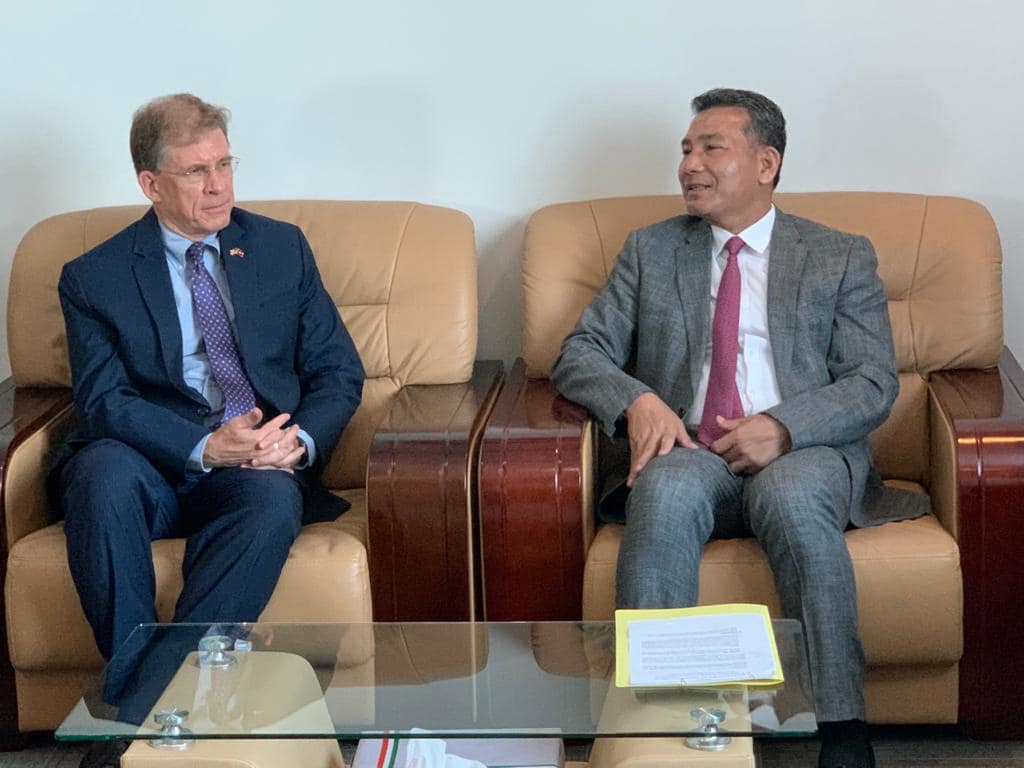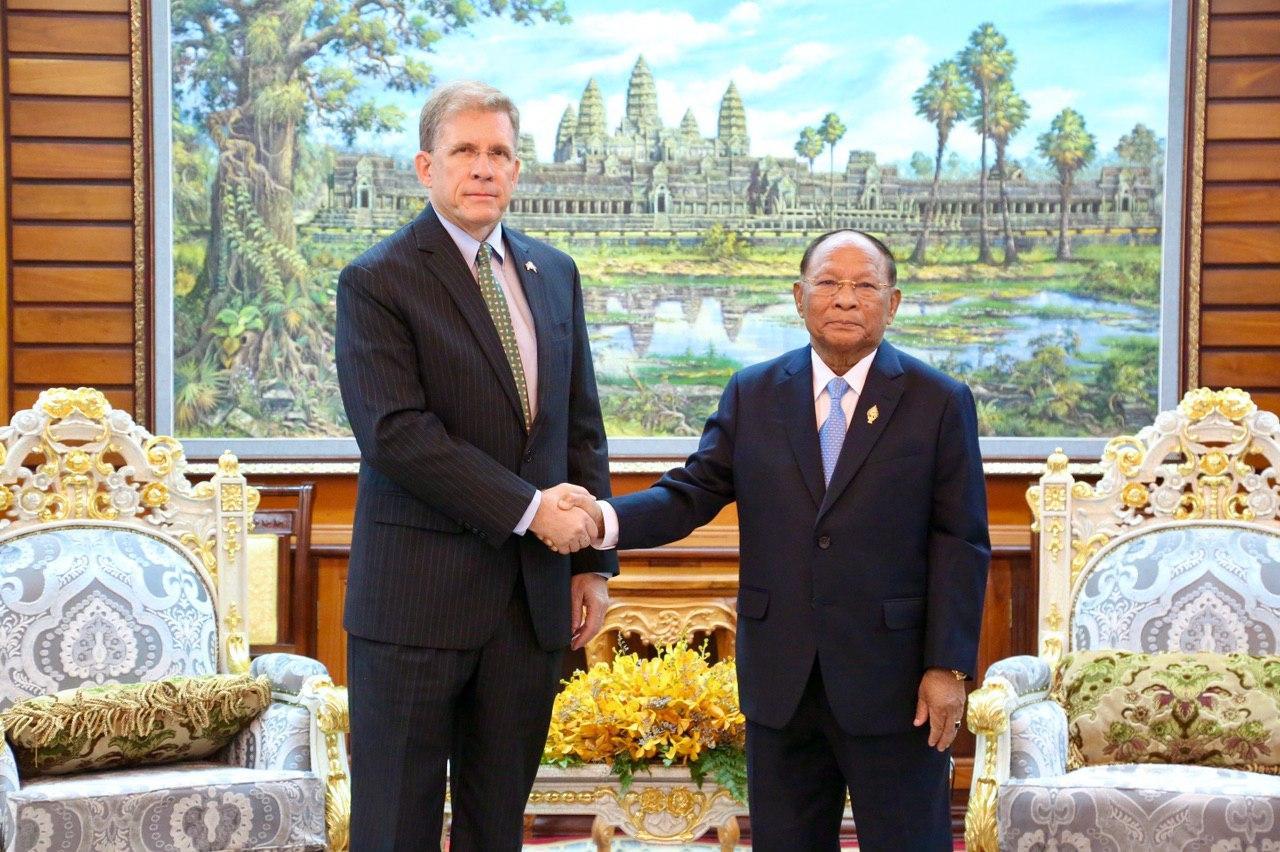Is Cambodia the right place for US agricultural companies?
Since taking office about five months ago, United States Ambassador Patrick Murphy has been working to improve relations between Cambodia and the US, which in the past has experienced tensions. One of his efforts is to encourage American companies such as Amazon, John Deer and IBM to invest in Cambodia, especially its agricultural sector. But, is it a right decision? Khmer Times’ COO Kay Kimsong has an exclusive interview with the US Ambassador about this issue.
KT: Can you give a brief insight about American companies and the agricultural sector in Cambodia?
Mr Murphy: Before we specifically talk about business in the agricultural sector, it is important to know that in the bigger scheme, we have an important relationship between Cambodia and the United States. Our economic and commercial ties are the important part of this relationship, on one hand. On the other hand, agriculture is very important in Cambodia, accounting for a quarter of its economy. It is also important for the United States, being a part of our history. That gives us a lot of common ground to work together, to improve the agricultural sector and by extension, the commercial and trading relationship.
KT: What do you see as opportunities for American agricultural companies from investing in Cambodia?
Mr Murphy: Many opportunities for a number of reasons. The Cambodian economy is expanding, but even as it grows, agriculture at the core remains very important for the livelihood of many Cambodians. It’s also a part of your cultural fabric; so many people have a connection to farms, which is a way of living, […] and I don’t think this will change in the near future. The challenge for Cambodia, as the economy grows, is to modernise agriculture so that it could keep up with the latest technology and techniques and be competitive within the international agricultural market and meet the domestic needs. Not all members of the population have the same standard of living, so, good food and food security. There are a lot of opportunities, not just for American business but the United States’ partnership with Cambodia, because we continue to have sizable assistance programmes here, including in the sectors related to agriculture.
KT: Why do you think it is important for American agricultural companies to do business in Cambodia?
Mr Murphy: I would say it represents an important opportunity for Cambodia and American firms but it doesn’t mean it’s an easy opportunity. There are some challenges and obstacles to entering the market here, but I think it is important for two reasons. There are many American companies that provide agricultural products which could not be found here, especially grains and specialty fruit and nuts. […] Secondly, agricultural firms in the United States are improving and extending their technologies and capabilities. These days, even small farmers need technology; they need to use iPhones and other types of product to understand the national market – changing prices, the best input to get the best yield from their farms – and the United States has a lot of experience in this because our small farmers struggled in past decades. They had to change and adapt to emerging technologies. So, if Cambodian farmers want to increase their yield, they will want to know where their products can go and need to have greater knowledge and even education. That’s why many of their children receive specialised education in agriculture.
KT: But, most Cambodian farmers do not have adequate knowledge and skills to accept these technologies. So how can they use it to replace their traditional ways of farming? And who should be responsible for teaching these farmers?
Mr Murphy: I think it does take time, but I don’t agree with the idea of replacing any particular output or practices per se. They have the opportunity to increase efficiency and maybe shift crops in the ways that adjust to climate challenges and water supply. They need proper information to adapt and to gain greater resilience. That’s how American companies can help. For example, farmers need to understand weather patterns. It’s not just a matter of waking up to look out to see whether the sun is shining or it is going to rain today. You may want to predict, to know about the water supply. Then, you want to know about transportation, market, the best crops and how you can rotate crops. You may not only want to produce crops but also to raise fish concurrently. I will give some examples of where the US is helping. We have a strong partnership in the agricultural field even before we start talking about American companies. Why? Because we know that a priority for Cambodia is to obtain food security for its entire population. Why do we want to help? We are friends of Cambodia but it is also our interest because a healthy, food-secured Cambodia can contribute to regional peace and security in other ways. So we have programmes right now to help with that: nutrition programmes helping mothers with new babies and programmes increasing farmers’ knowledge about what kinds of crop are best for the changing climate. On the macro level, we’re working with the Royal University of Agriculture here in Phnom Penh and the Ministry of Agriculture and Ministry of Education on a countrywide programme where Cambodia has increased technology. Some of this is associated with universities to introduce the technology part to local farmers, including the latest techniques and knowledge about inputs, the best kind of environmentally sustainable fertilisers and how to adapt to changing conditions. And we are receiving a lot of good feedback. […] When the farmers are doing good, they can get more income while the people can enjoy a better diet at affordable prices.
KT: What you have mentioned focuses on the domestic needs, but how about the large-scale level? And the products for export?
Mr Murphy: Your country is built on the back of small farmers. You don’t have giant industrial farms like those you find in some other economies. So helping small farmers at the micro level, I would argue, is perhaps the most important thing that Cambodia can do. So how can Cambodian farmers sustain their livelihood but increase yields and produce the products that meet the market’s needs? When you get to the point where you are food-secured, then you can think more about what you export. In fact, that is already happening, and we are helping with that. […]
KT: What are the challenges facing American companies considering investing in Cambodia?
Mr Murphy: That’s a good question for the authorities here. But, we see US investments growing there and the appetite is also increasing. But, as I said, it is not easy. American companies look for the fundamental rule of law. Rule of law is important while infrastructure is helpful, in terms of energy needs, cost of electricity, and the labour pool here, of course. Cambodia is doing well in some of these and has room for improvement in other areas. American brands are associated with quality – a kind of a gold standard and they look for those fundamentals. That’s where we want to ask the government and authorities to work on increasing the soundness of those fundamentals.
KT: What concerns have American companies expressed about the rule of law in Cambodia?
Mr Murphy: I think in general, American companies look for the laws to back up their investment. You need an independent judiciary that can make sound legal decisions. Sometimes, business contracts have misunderstandings. Sometimes, there are issues with profits and taxes. Often, there are issues with customs in many countries. Here in Cambodia, I don’t think it’s unique that there is always this type of conversation: how to strengthen regulations, how to improve transparency so that everyone could know what the law is and how it is applied.
KT: Is Cambodia’s government working on these concerns?
Mr Murphy: I think it is work in progress. Cambodia is a developing country. It has come quite some distance, as the country graduated from lower income status to lower-middle-income status. This is an economy that is getting larger and larger each year; with six, seven, eight percent growth each year, becoming some of the highest in the Asia Pacific. And the market of 17-18 million people is not a large market but a meaningful market. There have been a lot of positive changes. There has also been some difficulties; Cambodian politics is more complicated than complex. The companies do not get political, but they watch to ensure that there is a strong environment they can invest in; one which has security, guarantees and something that is sustainable.
We work with companies to help them navigate and enter the market here. We encourage them. We think it is a good thing for Cambodia to see more American investment and business presence.
Source: Khmer Times




